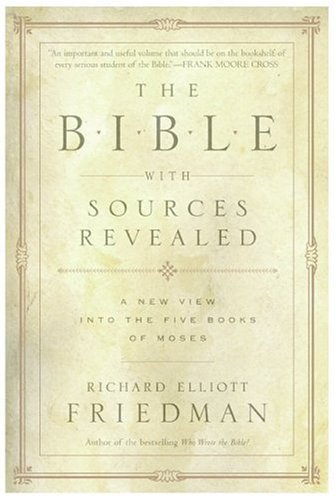Book review: The Bible With Sources Revealed
by Richard Elliott Friedman
★★★★
The first five books of the Bible are traditionally understood to have been written by Moses. In places, Jesus appears to confirm this. Most critical Bible scholars since the late 19th-century, however, have recognized at least four different contributors of the books of Moses:
A text known as J was composed during the period when the kingdoms of Israel and Judah were divided. J was written by an author living in the southern kingdom. It’s known as J because it refers to God by the name of YHWH (Jahwe in German).
A second text known as E was composed in the same period, by a priest living in the northern kingdom. It’s called E because it refers to God as Elohim.
A third text is known as P because it concerns the priesthood. There remains some argument about when it was composed; Friedman suggests shortly after J and E were combined into one text.
The final source is known as D because it comprises most of the book of Deuteronomy. It’s part of a longer work, including Joshua, Judges, 1 and 2 Samuel, and 1 and 2 Kings. It contains sources that date as early as J and E, but it was not compiled into one source until the reign of King Josiah, circa 622 BC.
All of these sources were spliced together by a redactor to create the Torah (the first five books of the Bible). Friedman discusses the evidence for this theory (called the Documentary Hypothesis), and then travels verse by verse through the Torah, color-coding the source and footnoting the setting. You’ll recognize two distinct creation stories in the Bible and two flood stories, and conflicting accounts within the Bible will suddenly make more sense, as the source and motive of the writings are revealed.
It’s best used as a reference book—I certainly haven’t read it straight through—but it’s a book I refer to often.












 354 Circles
354 Circles
 603 Goodreads Friends & Fans
603 Goodreads Friends & Fans

 Hello! I'm an author, historical Jesus scholar, book reviewer, and liberal Christian, which means I appreciate and attempt to exercise the humanitarian teachings of Jesus without getting hung up on any particular supernatural or religious beliefs.
The Bible is a magnificent book that has inspired and spiritually fed generations for thousands of years, and each new century seems to bring a deeper understanding of life’s purpose. This is true of not only Christianity; through the years, our age-old religions are slowly transforming from superstitious rituals into humanitarian philosophies. In short, we are growing up, and I am thrilled to be riding the wave.
I avidly read all thought-provoking religion titles. New authors: I'd love to read and review your book!
Hello! I'm an author, historical Jesus scholar, book reviewer, and liberal Christian, which means I appreciate and attempt to exercise the humanitarian teachings of Jesus without getting hung up on any particular supernatural or religious beliefs.
The Bible is a magnificent book that has inspired and spiritually fed generations for thousands of years, and each new century seems to bring a deeper understanding of life’s purpose. This is true of not only Christianity; through the years, our age-old religions are slowly transforming from superstitious rituals into humanitarian philosophies. In short, we are growing up, and I am thrilled to be riding the wave.
I avidly read all thought-provoking religion titles. New authors: I'd love to read and review your book!
 Hi! While Lee writes the articles and reviews the books, I edit, organize, and maintain the blog. The views expressed here are Lee's but I'm his biggest supporter! :-)
Hi! While Lee writes the articles and reviews the books, I edit, organize, and maintain the blog. The views expressed here are Lee's but I'm his biggest supporter! :-)
0 Comments
Trackbacks/Pingbacks